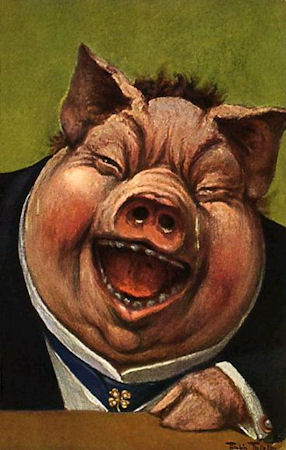Oh, there's a chill on Wall Street, all right, as we've already written. Big banks are behaving somewhat less like hedge funds with their taxpayer-insured billions, having cut back on proprietary trading. The attitude toward lending and renegotiation of terms is still the inverse of the manic bubble years, in other words reluctant at best, reflecting the time-honored values of an earlier era when the banking business was truly boring--or as one banker, Chuck Welter, put it to me for a Newsweek story in 2009, when its practitioners called it "the 3-6-3 club." In other words, "you paid 3 percent on savings, you charged 6 percent for loans and you were on the tee at 3 o'clock."
But we are kidding ourselves if we think Wall Street has really gone back to an era when it played its old role of serving the real economy, rather than the other way around. With the release of Noam Scheiber's new book, "The Escape Artists," we now have a substantial enough "rough draft of history" (the famous definition of good journalism proffered by Philip Graham) to establish that the structure of Wall Street, and its outsized influence on the real economy, have not really changed. In The New York Times today, the nation's most prominent book reviewer, Michiko Kakutani, places Scheiber in the lineage of chroniclers who have documented the rise of Wall Street at the expense of the rest of the economy (including yours truly, in Capital Offense: How Washington's Wise Men Turned America's Future over to Wall Street). Kakutani notes that Scheiber concludes, along with Ron Suskind, me and others, that the Obama administration could not bring itself to take on Wall Street in the end: "The banks, he says, 'won major concessions on nearly every element they’d fiercely resisted.' This not only fueled populist anger against the banks and the administration, Mr. Scheiber argues, but also left in place many of the elements (like poorly regulated derivatives and too-big-to-fail institutions) that had contributed to the 2008 cataclysm in the first place. 'As a package,' he writes, 'the reforms might mitigate whatever crisis strikes in the next 5 to 10 years. But they will not prevent it.'
This echoes what I wrote in Capital Offense more than a year ago:
"The Clinton administration’s former deregulatory brigade, now reincarnated as Obamaites, would, in the end, decide not to tamper too much with the world they had helped create. They would accept “too many givens,” says one senior Fed official who was distressed by minimalist approach being taken to regulation. The Obama team seemed to go on the assumption that you couldn’t roll back Wall Street from what it had become, though what it had become was close to being ungovernable. The firms would remain too big to fail, and very probably too big to regulate. The big banks would buy up the failing nonbank lenders, even with all of their bad lending habits and legal liabilities. The ratings agencies would keep their old business models, exchanging their assessments for payouts from the companies they were rating—Eric Kolchinsky, the former Moody’s managing director, alleged in hearings in late 2009 that even into the year after the crisis the firm continued to deceive investors by inflating ratings on dubious securities.
"Even more significantly, no one in power in
Washington dared to broach the fundamental issue: the extent to which the
dominance of the financial markets within capitalist system during this
freewheeling era — the fact that finance had come to hold the whip hand over
labor and the manufacture and production of “real” goods and services-- had
corrupted capitalism itself. Finance had once been a means to an end: the
growth of the real economy. Banking had once served industry and services. Even
in the robber-baron era, when J.P. Morgan and a few other lions of Wall Street
controlled a lot of the real economy, they had sought to add value; they had
created growth and jobs. .Now finance had become the end and the real economy
was subservient to finance."
None of this has yet changed. So let's not kid ourselves about boring banking.

No comments:
Post a Comment